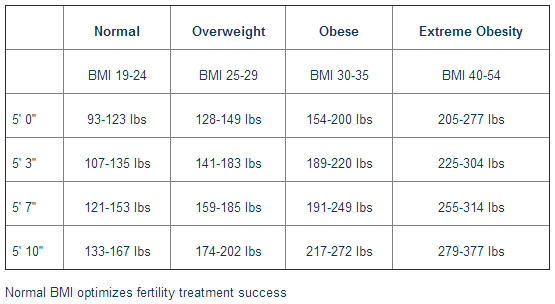The general health implications of maintaining normal weight have long been understood. People who are overweight experience a higher incidence of hypertension, diabetes, cancer and heart disease in addition to well-documented complications of pregnancy. More recently, studies have given us a better understanding of the effects of weight on fertility and fertility treatment. We will briefly review some of the considerations that make weight an important factor in the outcome of infertility treatment and pregnancy.
Both underweight and overweight women and men suffer from a higher incidence of infertility. Severe obesity in men has been shown to alter fertility often due to imbalances in hormone regulation tied to sperm production. In many cases, overweight or underweight women also may have hormonal disorders, which may cause them to ovulate infrequently or not at all. Generally, underweight patients (BMI less than 19) can be encouraged to gain more weight, and this alone often increases their fertility significantly or makes hormonal therapy more successful. On the other side of the spectrum, many studies have demonstrated a clear and consistent decrease in infertility with increasing female weight. Overweight patients who undergo significant weight loss may ovulate without the need for fertility medications. Ideal body weight results in the best outcome for fertility therapy and outcome for both mother and baby. A useful reference is the American Society of Reproductive Medicine campaign “Protect Your Fertility” 1 (www.protectyourfertility.com) which educates patients of four important factors affecting their fertility: cigarette smoking, increased reproductive age, sexually transmitted diseases, and decreased or increased body weight.
A recent American College of Obstetrics and Gynecology (ACOG) Committee Opinion 2 states that patients should be weighed and have their heights measured at their initial visit and that comprehensive measures be discussed if the patient is overweight. It is surprising to many patients what weights are medically considered overweight, obese and extremely obese. According to the prestigious Institute of Medicine, obesity is defined by a measure calculated by the height and weight of the patient to give the body mass index or BMI. Normal BMI is defined by an index of less than 25; overweight patients are defined by a BMI 25 or greater; obesity is defined as Class I obesity with a BMI of 30-34.9; Class II as BMI between 35-39.9 and Class III as BMI 40 and above. You can determine your BMI by using the online BMI calculator: http://www.nhlbisupport.com/bmi
Examples of what weight converts to what BMI for some average heights

